D-Day for donors as vaccines summit aims to raise $7.4bn
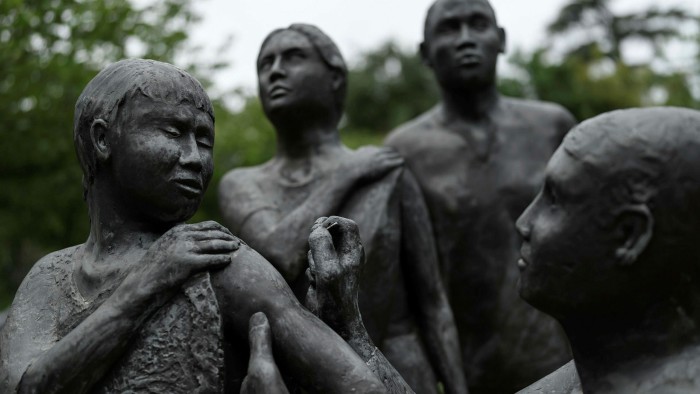
Roula Khalaf, Editor of the FT, selects her favourite stories in this weekly newsletter.
Welcome to FT Health, a monthly guide to the big issues at the intersection of global health and finance. Technology and investment are changing the face of healthcare while coronavirus is bringing an unprecedented focus on the world’s health systems. This newsletter delivers news, interviews, data and the best health journalism from across the web. Send us feedback at health@ft.com.
FT subscribers can sign up for the email version here and non- subscribers here.
At a time of growing nationalism and the deep distractions of Covid-19, richer countries’ generosity and solidarity will be put to the test tomorrow at the five-year replenishment conference of Gavi, the vaccines alliance.
The UN-backed organisation, which channels donor support to pay for immunisation programmes in the world’s poorest countries, is seeking $7.4bn for 2021-25 to maintain its efforts to protect children from diseases such as measles.
The “vaccine paradox” — which also fuels anti-vaccine sentiment — is that the more successful such programmes prove, the less the world recalls the heavy burden of scourges they have eliminated.
Yet the need for assistance is greater than ever, as lower-income countries face a double burden from coronavirus. The pandemic has caused both the life-threatening delay of many other health programmes, including vaccination, and an economic hit that will further weaken health systems’ ability to respond.
The summit, hosted by the UK, will also be a reminder of the weaknesses of the global vaccine supply chain. Low prices for vaccines in poorer countries mean no margins for manufacturers who are more interested in richer, more profitable markets. This has led to shortages in poor countries of vaccines like HPV to prevent cervical cancer. This could be a foretaste of tensions to come in the months ahead as and when progress is made in the development of Covid-19 vaccines.
Three questions
Jane Aceng, Uganda’s minister of health
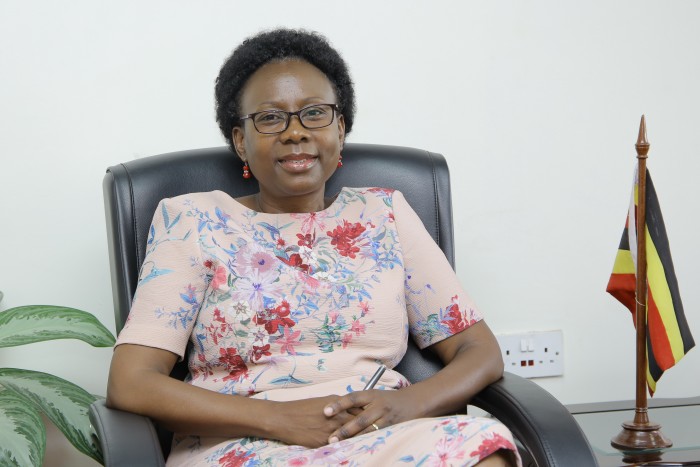
How is Covid-19 affecting your country?
It has had its toll on the health systems, resources, health workforce and the entire wellbeing of the population. Right now there are only sporadic cases, but we are cognisant if we don’t put in a lot more effort it may grow. With unrest in South Sudan, we have refugees flooding into the country through undesignated points of entry and we already have positive cases. Our teams already have experience from Ebola to identify and track and they are conducting rapid assessments now.
What are the challenges of responding?
Diagnostics is a nightmare. Access to test kits and personal protection equipment is nearly impossible. Every outbreak comes with many challenges including fear by the general population. A lot needs to be done on risk communication and education to garner trust. In early March we had a lockdown, so access to healthcare was hampered by the prohibition of vehicles. Now that is lifting. I’m also worried about malaria with flooding after the highest rains since 1964, and tuberculosis, [and want] to ensure patients still have access to their medicines and can be monitored. And we are keeping our eye on yellow fever and Ebola from DRC [Democratic Republic of Congo].
What is your message to donors about funding immunisation?
I understand many are constrained by having to think about Covid on one hand and immunisation on the other. This is the time to donate to immunisation even more than before. After the pandemic, it will be very sad if we discover many countries fell behind on immunisation. Gavi needs funds to make sure money is available, freely flowing and easily accessible so we can continue the gains we have made with vaccination by ensuring everyone has equitable access. It’s an intervention that works, pays off and is one of the cheapest ways to improve the economy of a country.
News round-up
Coronavirus trajectory The WHO warned of an “immediate second peak” if countries lifted lockdown restrictions too soon. Since mid-April, the focus has shifted to the US where waves of political protest risk causing a new spike in infections. Latin America and the Caribbean has recently seen its share increase, fuelled by a surge in fatalities in Brazil. Here’s what a second wave of infections might look like and here’s a video discussion featuring The Global Fund’s Peter Sands and others on the “nightmare scenario” of the virus persisting in poorer countries. (Reuters, The Conversation, Devex, FT graphic)
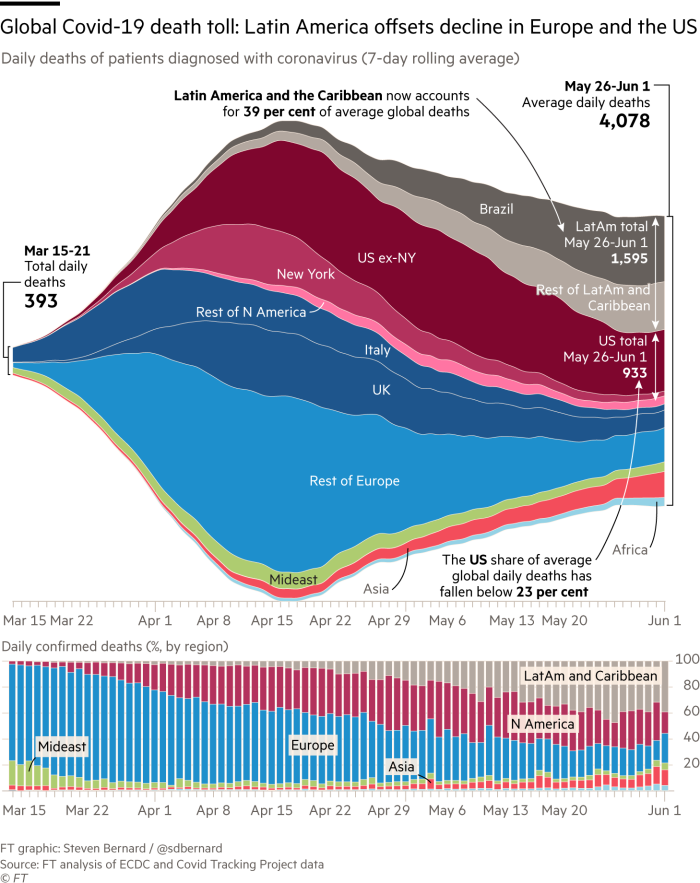
Explore the FT’s collection of data about the pandemic and its trajectory, lockdown measures and other indicators via our tracker page.
WHO Trumped President Donald Trump’s declaration that the US would leave the WHO after sustained criticism of the organisation’s relationship with China has drawn strong criticism from global health experts and brought fears that the decision would set back the fight against Covid-19. The WHO has set up an independent foundation to help broaden its donor base and work towards “more sustainable and predictable funding.” (FT, Foreign Policy, Nature, WHO)
Financing the fight A group of current and former world leaders called for an emergency G20 meeting and a $2.5tn coronavirus package for developing countries. The EU response has so far registered €9.8bn in pledges with another session set for June 27. Here’s a critique of bids by low-income countries for World Bank assistance. Philanthropists are also looking to get involved. This Devex interactive tracks the financing of the global response.
The WHO’s Covid-19 technology access pool, or C-Tap, aims to make treatments, vaccines and tests accessible to all, but is opposed by the US and pharma companies which argue patents are necessary to protect risky investments made to bring new molecules to market. (Independent, EU, The Conversation, FT, Devex)
Vaccine hunt Here’s our Big Read on the need for reality checks for advocates like President Trump of “warp speed” vaccine research, who downplay the technical complexities involved. Health experts fear “vaccine nationalism” could slow the global response. Here’s a glossary of vaccine accessibility jargon. (FT, Devex)
Ebola and infectious diseases A new outbreak of Ebola in the Democratic Republic of Congo — the fourth in the past three years — is a reminder that other killer diseases — such as HIV, TB and malaria — remain a serious threat, especially in developing countries, and are being hampered by the world’s focus on Covid-19. (FT report and graphic, Global Fund)
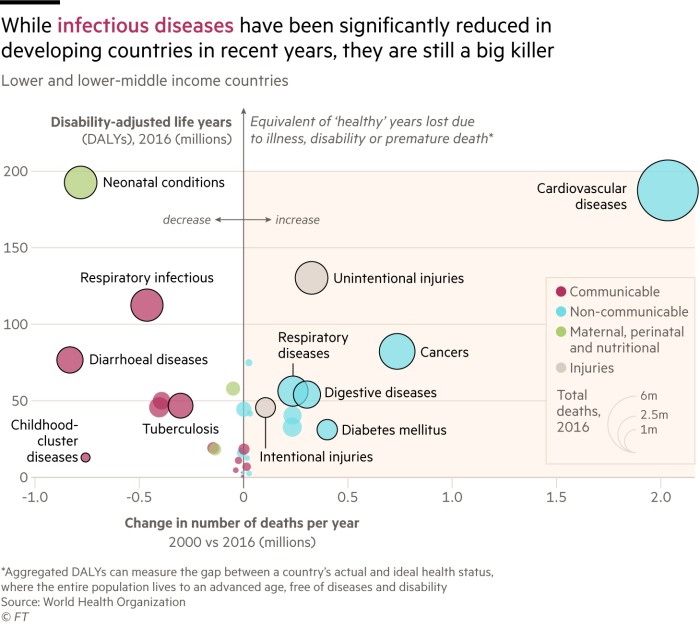
Non-communicable diseases Progress on non-communicable diseases is also being hit, according to a WHO survey. The NCD Alliance pointed out that people with unhealthy diets, who smoke, use alcohol, lack physical activity and suffer from air pollution are also far more vulnerable to coronavirus. A new initiative from Novo Nordisk, one of the big three pharma companies specialising in diabetes, aims to improve access to treatment in poorer countries. (WHO, NCD Alliance, Novo Nordisk)
Nutrition crisis The Global Nutrition Report, a UN-backed audit, laid bare the scale of the poor diets that make people in lower-income countries and disadvantaged groups within richer ones more susceptible to coronavirus. It follows warnings that numbers facing acute hunger across the world will double as poorer countries’ already fragile economies are devastated by Covid-19 lockdowns. (GNR, FT)
Covid-19 and inequalities Public Health England said coronavirus mortality rates for ethnic minorities were almost double those of their white counterparts. The largest disparity in coronavirus-related deaths was age, with people aged 80 or older seventy times more likely to die than those aged under 40. Mortality rates in the most deprived areas were also found to be double those in least deprived areas. (FT, BMJ)
Lockdowns and mental health The WHO warned of the “extremely concerning” effects of the pandemic on mental health, a crisis deepened by the unsettling effect of having to mourn in isolation. A new study shows the impact on health workers while another examines the mental health affects of Sars and Mers and their relevance to the current crisis. (CNN, FT, Jama, The Lancet Psychiatry)
Drugmakers hooked on data The drive to digitise medicine is providing a treasure trove of information for pharma groups, but while developments could help progress in poorer countries, there are many questions about the implications for privacy and for regulation. Explore the issues in our magazine: The Future of AI and Digital Health, part of the FT’s ongoing joint commission with The Lancet. (FT, The Conversation)
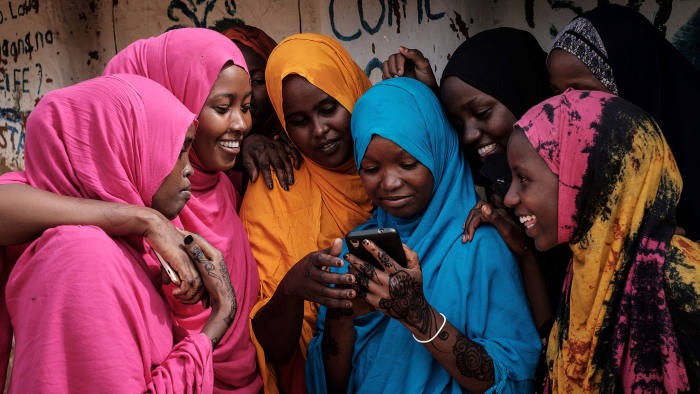
Women’s health The UN rejected accusations from the US that it was using the coronavirus pandemic as an opportunity to promote abortion. USAID said the UN gave “sexual and reproductive health” the same level of importance as food, shelter and sanitation. The crisis has also led to expectant mothers in many countries being denied beds, pain-relief and contact with their babies. (Reuters, Guardian)
Boosting breastfeeding A WHO update on marketing breast milk substitutes said countries were still falling short in protecting parents from misleading information. The WHO and Unicef recommend that babies be fed nothing but breast milk for their first six months. Infants who are not exclusively breastfed are 14 times more likely to die than those who are, the WHO says. Here’s an interview about Brazil’s human milk bank network. (WHO)
Period poverty Menstrual Hygiene Day last week highlighted the effects of the pandemic on period poverty and other menstruation-related challenges faced by women and girls around the world, a particular problem in countries such as India. (MHD, The Independent, The Lancet)
On the margins From the Black Death onwards, marginalised people have always fared worse from pandemics. In Brazil, one of the countries worst affected by Covid-19, Amazon tribes have had to turn to traditional medicines because of the lack of health services in remote areas. (Science, France 24/YouTube)
Smoke signals World No Tobacco Day on Sunday focused on the harm to young people caused by smoking, and criticised the role of social media influencers and corporate sponsorship of events to promote tobacco. Data from the Global Youth Tobacco Survey show that at least 14m young people aged 13 to 15 use tobacco products. (WHO, CDC)
Locust-19 As if Covid-19 was not enough, India, Pakistan and Africa are having to fight off devastating waves of locusts. Watch our interview with Akinwumi Adesina, president of the African Development Bank. (Nikkei Asian Review, ITV news, FT)
The connectivity gap As our digital health magazine illustrates, there is great potential for mobile technology to revolutionise healthcare. Mobile internet however is unaffordable in many poorer countries and access within them is unequal: less than half of women own mobile phones in some countries, with the gender gap even larger for rural and poorer women. (FT, BMJ study)
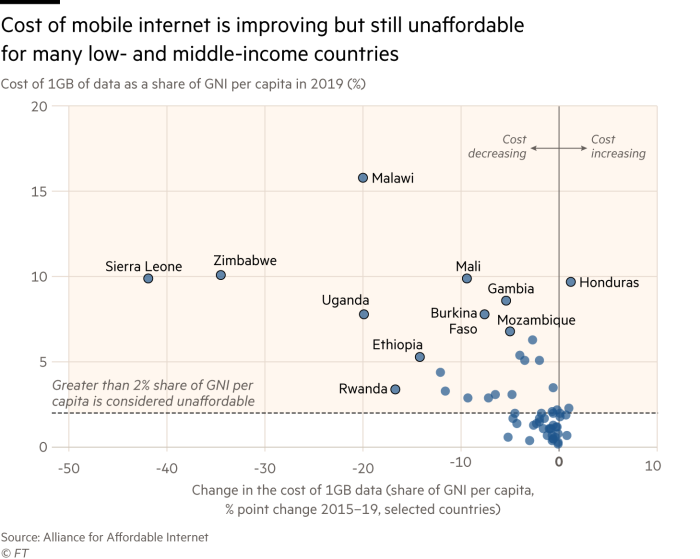
Best from the journals
Keep your distance The most comprehensive study of coronavirus transmission to date confirms the effectiveness of two-metre distancing and the wearing of face and eye protection. Previous analyses were mainly based on prevention of influenza and other diseases which behave differently to Covid-19. (The Lancet)
Antibiotic alarm A global survey spanning a dozen years shows rising use of antibiotics in children under five in the world’s poorest countries. A new WHO survey showed “disturbing” rates of antimicrobial resistance around the world and expressed concern the trend would be further fuelled by the inappropriate use of antibiotics during the Covid-19 pandemic. (The Lancet, WHO)
Covid-19 susceptibility A large study of Covid-19 deaths in the UK lays bare the increased risk factors of age, male sex, obesity and underlying illness. Another report highlights how cancer patients — and survivors — are at an elevated risk of dying from the virus. The first study of Covid-19 hospital patients with diabetes shows that 10 per cent die within seven days of hospital admission (BMJ, Lancet, Diabetologia)
Active commuting People who walk and cycle to work are at lower risk of death or serious illness compared with those who drive. The authors say that cycling means a 20 per cent lower risk of death overall, a 24 per cent lower risk of dying from cardiovascular disease and a 16 per cent lower risk of dying from cancer. (The Lancet, The Conversation)
Covid-19 and surgery Over 28m elective surgeries across the globe could be cancelled as a result of the pandemic — leading to patients facing a lengthy wait for their health issues to be resolved. Another study shows patients undergoing surgery after contracting the virus are at much greater risk of post-operative death. (British Journal of Surgery, The Lancet)
Art and health Arts-based approaches to improving healthcare in Africa — from song and dance to theatre and puppetry — have been widely used in tackling HIV/Aids but there is great scope for applying to many other diseases. A Hollywood animation studio is helping deliver coronavirus health messages to children. (BMJ, WHO)
Pick of the pods
WHO woes A discussion on “the history, necessity, and vulnerability” of the World Health Organization. (The Atlantic, 25m)
Vaccination fears A discussion on how Covid-19 is interrupting routine childhood immunisation in developing countries. (Global Dispatches, 30m)
Fake news How viral epidemiology can be used to combat misinformation on social media. (BMJ, 16m)
Africa and coronavirus The director of the Africa CDC and the US ambassador to the African Union discuss the medical, economic and food crises facing the continent. (CSIS Take as Directed, 41m)
Covid-19 fears Fiona Godlee, editor of the BMJ, says the pandemic is even more serious than recognised, criticises the response of the UK government and warns that a second wave of infections is “sadly inevitable”. (Media Masters, 50m)
The month ahead
June 3-4 Global Vaccine Summit
June 5 FT Coronavarius and Logistics special report series continues
June 8 World Brain Tumour Day
June 10-16 Men's Health Week (UK)
Jun 14 World Blood Donor Day
June 18 New episode of FT How to Build a Healthy City podcast. Darren Dodd talks to colleagues in London, Paris and New Delhi to understand how the coronavirus pandemic has brought home the need to combat health inequalities and how cities can be made more resilient.
June 26 World Drug Day
June 27 EU coronavirus pledging summit
End notes
Previous issue: We’re not all in this together
Contact Email us via health@ft.com, like us on Facebook and follow us on Twitter @fthealth and LinkedIn.
FT Health by email Register here to get FT Health in your inbox on the first Wednesday of each month.
More FT resources You can find all FT in-depth health reports at FT Health Centre.
Coronavirus Business Update Sign up here for our newsletter chronicling the epidemic’s impact on markets, global business, workplaces and our daily lives. The FT is offering a free 30-day trial to this email, which includes access to FT.com.
Final thought
Is there room for optimism amid the despair? Jared Diamond, the Pulitzer Prize winning geographer, thinks so. “If the world joins to solve the current visible Covid-19 crisis against heavy odds, our current pandemic might thus represent the beginning, not of a dismal era of chronic worldwide danger, but of a bright era of worldwide co-operation.”
Comments